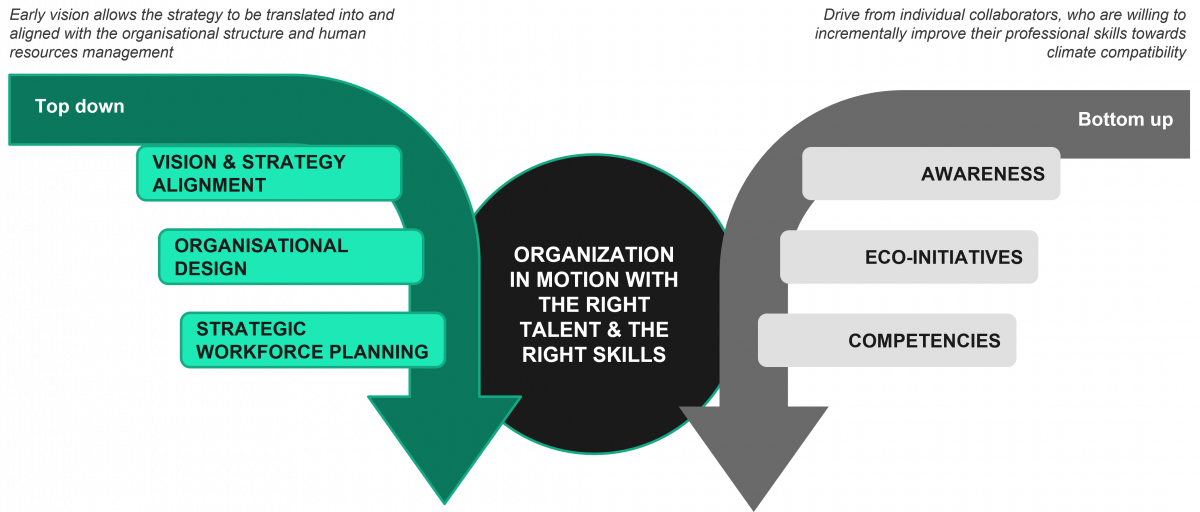Carbon Accounting Management Platform Benchmark…

Addressing organizational and talent needs, to support the company’s reinvention in addressing climate challenges
Both consumers and brands have a role to play in climate action, although their expectations of each other stand in the way of shared impact: a blame game, described a situation where actors of an ecosystem blame one another rather than acting together for a solution. Applied to climate action, the blame game prevents People and Private sector to shift supply and demand dynamics towards greener alternatives.
Consumers believe the responsibility for improved environmental solutions and information lies with companies and brands.
Meanwhile companies and brands require consumers to make greener consumer choices and to accept more responsibility.
A heightened sense of common responsibility for all members of society can help share and carry the burden together... This is why it's worth investing in the mutual interest, and a common driving force, of Employees and Employers. This could accelerate companies' progress towards greener, more virtuous operations and products.
To accelerate the corporate shift towards greener operations, we propose a two-stream approach, accelerating the green transition of organizations and their talents.

To ensure a long-lasting, sustainable approach, the strategic, top-down strategy requires a green twist with scientific backup, a pragmatic organizational design and proactivity regarding the scarcity of green jobs.
To formulate a clear strategy that prioritizes ambitions between a minimum standard and best practices on sustainable matters, the key is to anchor the company vision in a broader understanding of green challenges and facts.
Develop vision and ambition, based on a double materiality assessment.
Define Environmental, Social and Governance priority areas and goals within the scientific UN SDGs / SBTi / IPCC frameworks.
Develop reporting metrics of the green strategy in light of regional legal frameworks like CSRD.
To set the right framework for the company and maximize its efficiency in the green transition, the organizational design phase focuses on collective ownership and adaptability throughout the organization while enabling key departments to evolve.
Break down the company’s goals into smaller scope objectives (by business unit or department) and transparently share them.
Reshape R&D teams. Procurement and Finance; rethink the modus operandi of Marketing.
Nominate an agile SPOC function or team in every entity, for operational relevancy and quick escalation capacities.
Green jobs “aimed at substantially preserving or restoring environmental quality”, as defined by the International Labour Organization, will be needed in most, if not all, activities within the company, yet, the availability of such profiles is still low. Strategic workforce planning is a Human Resources method to identify and bridge gaps between the current and future workforce to achieve strategic goals.
Adding a green operations dimension to Workforce Planning requires companies to:
Consider a variety of skills needed in the green transition, not only technical, but also soft skills.
Assess quantitatively, be flexible in the qualitative approach.
Address the skills gap in “Sustainable academies” with the help of long-term training partners.
What is the right positioning of a company when educating employees on green matters? In order to remain relevant, and not overstep boundaries in privacy, communications from corporate should navigate two polarities: talking to the professional individual and embedding the messages in the company’s collective.
Inform and educate about climate challenges with direct links to the company’s sector.
Nudge employees towards more proactive and virtuous behaviors at work.
Enrich the awareness stage with interactive sessions, based on collective involvement.
Employees possess operational knowledge and ideas to improve ways of working. Their collective creativity is a powerful factor to deliver sustainable quick-wins in operations. Unlock your people’s potential to act on sustainable matters at a small scale.
Create a broader culture of purpose-fed innovation with circular economy fundamentals.
Partner with experts to brainstorm and help frame ideation.
Initiate, select and support initiatives within a self-administered governance.
The launch and deployment of eco-initiatives are unique opportunities to support the development of employees’ green skills.
Green data analytics: demand reporting on sustainability KPIs and contribution of projects on a strategic axes.
Transformation management skills: training programs to enable structural change, systematically.
Power skills: help diffuse green best practices with communication skills.
It is crucial for companies to launch and achieve their sustainability goals if they wish to remain relevant and attractive to talents. Collaborators are the enablers and accelerators, as long as they feel supported.